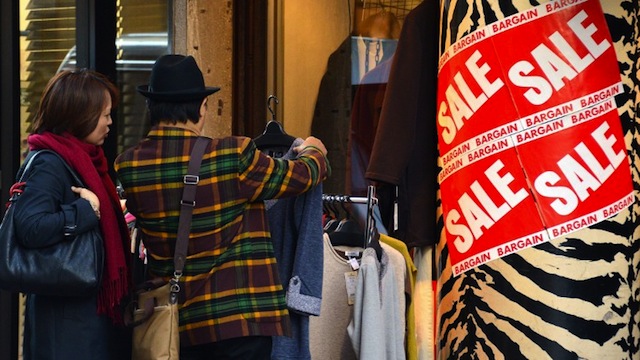SUMMARY
This is AI generated summarization, which may have errors. For context, always refer to the full article.

TOKYO, Japan – Japan said Thursday, November 14 that growth halved in the September quarter as exports slipped and consumer spending slowed, in a worrying sign for Tokyo’s bid to kickstart the world’s third-largest economy.
Official data showed the economy expanded by 0.5% in the 3 months to September, slightly higher than economists’ expectations but a marked slowdown from 0.9% growth in the previous quarter.
On an annualized basis, growth slumped to 1.9%from 3.8% in the previous 3 months – showing the pace of expansion if the data were stretched across a full year.
The earlier growth outcome was largely a result of a boost in exports owing to a sharply weaker yen, while stubbornly low consumer spending also showed signs of picking up.
The long-lagging economy has lately been outpacing other G7 economies as a policy blitz led by Prime Minister Shinzo Abe, dubbed “Abenomics,” helped drive down the currency and stoked optimism over Japan’s prospects.
However, analysts have been warning that the program – a mix of big government spending and central bank monetary easing – is not enough on its own without promised economic reforms which have yet to be seen.
The proposed shakeup, including loosening rigid labour laws and inking wide-ranging free trade deals, are seen as key to ushering in lasting change in an economy plagued by years of deflation.
On Wednesday, Japanese legislators passed a bill that paves the way for an opening up of the protected electricity sector, but other key reforms have so far been mostly talk.
Despite the downbeat data, Masahiko Hashimoto, economist at Daiwa Institute of Research, said it was too early to cast a verdict on Abenomics with consumer spending still “solid” and exports expected to turn up as key Asian demand bounces back.
“Income is improving,” Hashimoto said. “Personal spending will surely accelerate before the consumption tax hike (in April).”
The nation’s factories have been expanding production, with demand from Japanese consumers for electronics and cars improving ahead of the tax increase, which is seen as crucial to bringing down the country’s staggering national debt.
Still, cautious firms have been reluctant to usher in widespread pay or capital spending rises after years of lacklustre consumer demand weighed on their expansion.
Deflation encourages consumers to put off spending in the hope goods will be cheaper down the road, which hurts producers.
However, Japan’s thrifty households have been boosting their spending and unemployment has turned down, suggesting a tighter jobs market, while wages have been creeping higher.
Crucial to Abe’s drive to reverse years of falling prices and anaemic growth are vast easing measures unleashed by the Bank of Japan in April.
The BoJ’s quarterly Tankan survey in October showed business confidence had soared to a more than 5-year high, while consumer price data suggested Tokyo was winning its battle to achieve sustained inflation.
But critics of Abenomics say growth so far is largely thanks to stimulus spending and the BoJ’s injections of vast amounts of money into the financial system, similar to the US Federal Reserve’s quantitative easing. – Rappler.com
Add a comment
How does this make you feel?
There are no comments yet. Add your comment to start the conversation.